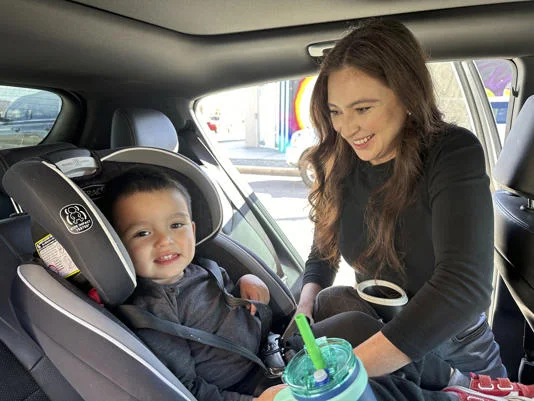**Child Care Across America: Challenges and Innovative State Solutions**
**ALBUQUERQUE, N.M. (AP)** — Families across the United States face a common problem: child care is often prohibitively expensive, difficult to access, and financially unstable for providers and their employees.
The Biden administration and Congress took steps to address these issues during the pandemic by allocating a historic $52.5 billion in relief funds.
However, as these funds run out, many states have developed their own solutions. States have expanded free preschool and early education programs and provided financial assistance to make child care more affordable or even free for many families. With a federal solution not expected soon, states have created sustainable funding methods for these programs. New Mexico, for example, utilizes revenue from its petroleum industry, Washington state has implemented a tax on investment profits, and Kentucky offers incentives for parents to work in child care.
While the most substantial investments have come from Democratic lawmakers, Republican legislators also support these initiatives due to their economic significance.
**NEW MEXICO'S FUNDING INITIATIVE EMPOWERS CAREERS**
After giving birth, Marisshia Sigala had to postpone her real estate career. She and her husband, a personal trainer, survived on one income for two years, finding child care costs too high.
In 2022, New Mexico made child care free for nearly all families by amending the state constitution to fund early childhood programs using revenue from state land leased to oil and gas companies.
This amendment is projected to generate around $150 million annually for early education. Sigala and her husband, whose combined income is less than 400% of the federal poverty level (approximately $120,000 annually for a family of four), qualify for this benefit.
Their son, Mateo, is one of over 21,000 children benefiting from these subsidies. Sigala is now back at work, and Mateo attends Koala Children’s Academy, which provides bilingual education.
"Being entrepreneurs, it’s a lot more challenging, and we have to rely on ourselves. We don’t have a paycheck coming in every week,” Sigala said. “It’s been a blessing for us.”
Expanding free child care is profoundly impacting families and supporting child care providers, according to Elizabeth Groginsky, New Mexico’s early childhood education secretary. This significant investment aims to reduce poverty's effects.
**WASHINGTON STATE'S PRESCHOOL EXPANSION**
Washington state aims to offer free preschool to all low-income families and provide child care vouchers to low- and moderate-income families by the end of the decade.
Additionally, it plans to offer high-quality care for infants and toddlers with developmental concerns. This expansion is funded by a new 7% tax on profits from residents’ financial investments, targeting wealthier individuals.
Zaneta Billyzone-Jatta, a clinical manager, faced challenges balancing work and caring for her premature daughter, Zakiah.
Through a state program, Zakiah now attends a child care center near their Seattle home at no cost, receiving dedicated attention and developmental support from teachers and therapists.
The program is currently small, serving fewer than 200 children statewide. However, a November referendum could repeal the tax funding this initiative, which child care advocates warn would jeopardize its progress.
“It would be catastrophic,” said Jon Gould of Akin, the nonprofit that operates Zakiah's state-supported child care center.
**KENTUCKY'S SUPPORT FOR CHILD CARE WORKERS**
Rylee Monn, employed at Baptist Health Child Development Center in Lexington, considered quitting her job due to the high cost of child care. In 2023, Kentucky launched a program to cover or reduce child care costs for industry workers, addressing worker shortages and making child care more affordable for families.
Delaney Griffin, previously employed at a pizza restaurant, joined Baptist Health Child Development Center thanks to this benefit. She now pays about $5 per week for child care, enabling her to start a new career while her older child attends preschool.
“The free child care part was the biggest reason that I actually got to start in child care,” Griffin said.
This series on the child care crisis and solutions is produced by the Education Reporting Collaborative, a coalition of eight newsrooms, including AL.com, The Associated Press, The Christian Science Monitor, The Dallas Morning News, The Hechinger Report, Idaho Education News, The Post & Courier, and The Seattle Times.
The Associated Press' education coverage is supported by multiple private foundations. AP is solely responsible for all content. Find AP’s standards for working with philanthropies, a list of supporters, and funded coverage areas at AP.org.

